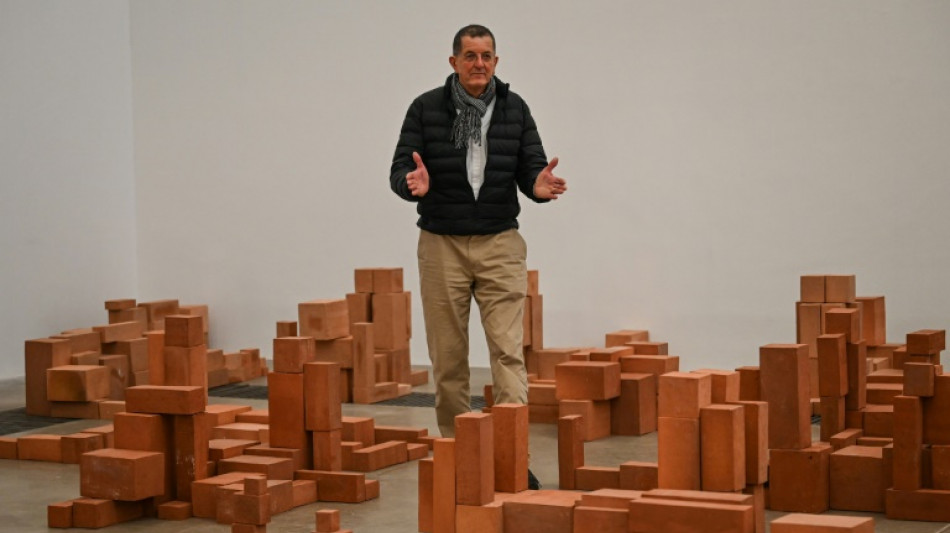
RBGPF
0.1600


Renowned British sculptor Antony Gormley has told AFP of his concern over the "uglier sides" of China's state control but says artistic engagement with the historic and cultural powerhouse is crucial.
The artist most famous for his vast 'Angel of the North' roadside statue in northeast England championed art as a force for fostering cross-societal understanding and said he wants to continue showcasing his work in China.
"It's absolutely essential, because art is a bridge between hearts and minds, and people that come from totally different ideological but also geographical places," Gormley said at a factory-turned-gallery in the capital's trendy 798 art district, ahead of a new exhibition opening Thursday.
The 74-year-old, however, expressed dismay at "the uglier sides of state control", citing the repression of minorities in the northwestern Xinjiang and western Tibet regions.
He pointed also to China's "brutal" Covid-19 lockdown policies and a turn towards a "cult of personality" under President Xi Jinping.
China's art industry has boomed in recent years, welcoming world-renowned figures like Gormley, but many homegrown artists have faced tighter control from authorities.
In August, Chinese police detained artist Gao Zhen, known for his works critiquing the Cultural Revolution, while dissident Ai Weiwei has lived in exile since 2015.
- Influenced by China -
In a vast warehouse in 798, Gormley's 'Resting Place II' -- comprising 132 life-size human figures each made up of 26 to 30 Chinese-made bricks -- goes on display alongside five cast iron sculptures and a selection of drawings.
Together these pieces form the sculptor's latest exhibition 'Body Buildings' -- his 14th in a country he has visited regularly since the mid-1990s.
Gormley cited the ancient city of Xi'an, Beijing's hutong alleyways, traditional Chinese medicine and the ancient philosophy text Tao Te Ching among his influences for the collection.
"I was fascinated by the diversity of Chinese culture and its material sophistication in a very early period," he told AFP.
'Resting Place II', Gormley said, is partly a reflection on the individual and collective, and China's rapid economic growth has made it "a very large experimental ground for this relationship".
At ground level the stacked bricks appear like scattered buildings, but from a height they reveal themselves to be a labyrinth of bodies lying in various poses.
"It's much more about this country's transformation from hutong life to high rise, high density, 80-storey towers, and what that means in terms of the social order," Gormley told AFP.
In early visits to the south of the country, he said, "what struck me so forcibly... was how much of life was on the street".
Urban China has since become a more private, atomised society, and Gormley hopes 'Body Buildings' will allow audiences to reflect on how they exist in their own bodies, in buildings, and in cities.
"My work is not activist art that is trying to resist or revolutionise the status quo," he said.
"It is simply an attempt to provide a... reflexive evocation of our present situation."
- 'Democracy is failing' -
Activist or not, Gormley is worried about political trends -- and not just in authoritarian systems.
"We live in a time in which democracy is failing, simply because it can be manipulated by all forms of media," he told AFP.
He said the media in the West creates echo chambers, pointing to Donald Trump's recent election victory as evidence: "The Fox News brigade have triumphed by calling everybody else's news 'fake news' and creating their own triumphalist fake news."
Gormley sometimes appeared more optimistic about China's future: "[China] seems to manage to live under this, you could say, lid or absolute ceiling of state control, while actually allowing for a huge range of personal creative freedoms."
Among young people and on Chinese campuses Gormley sees "a wide ranging, far reaching interest in other cultures; other ways of being and doing".
"We should expect China and India to rise as intellectual... guides for the future development of humanity," he said.
Nor is Gormley fatalistic about artificial intelligence.
Though sceptical of AI art, which he said "stinks of artificiality", if AI replaces humans at work "the opportunity for everyone to truly become creative becomes realizable -- that's exciting".
In an increasingly polarised world, Gormley sees art as more important than ever.
"I just absolutely believe that art is a tool of self-determination as well as a tool... for people to think about their condition."
"I would trust artists more than politicians these days."
M.Saito--JT